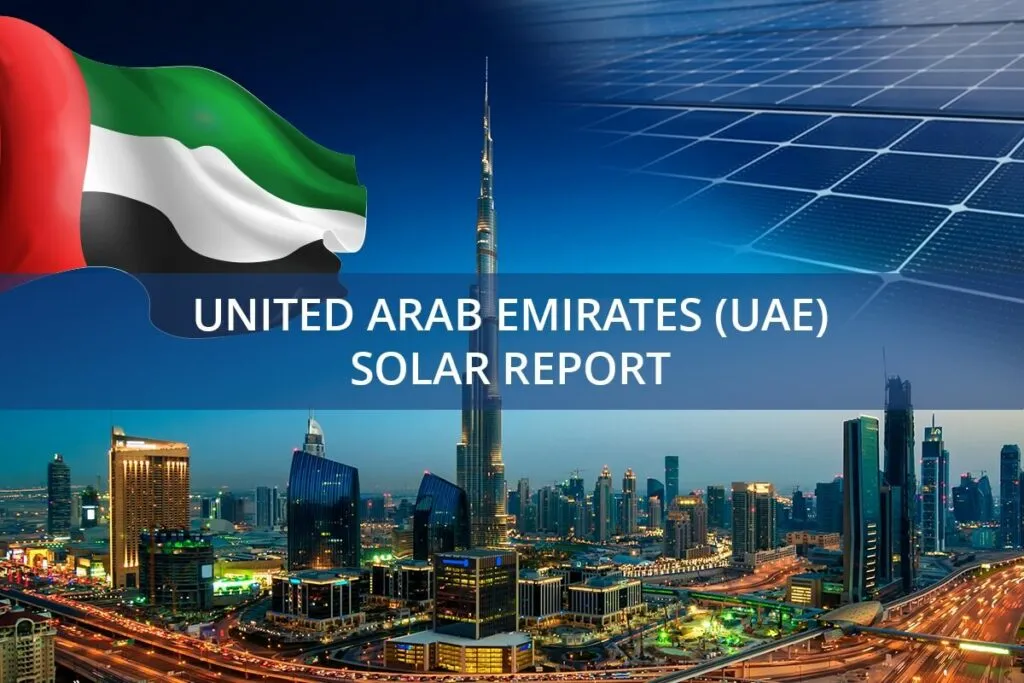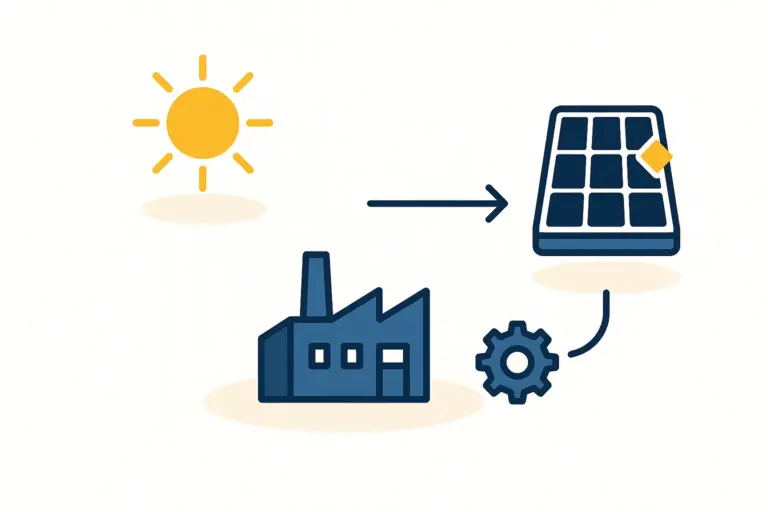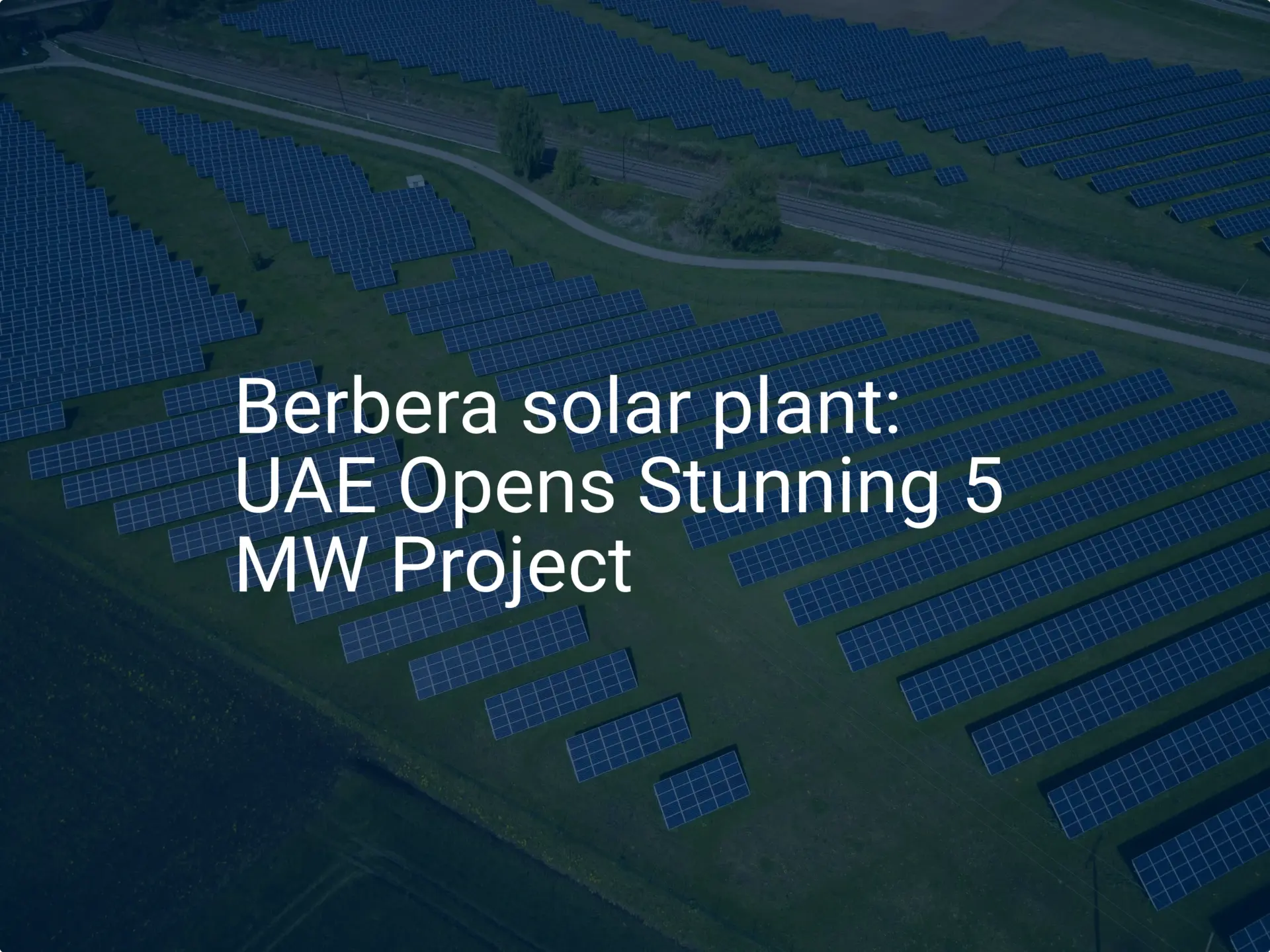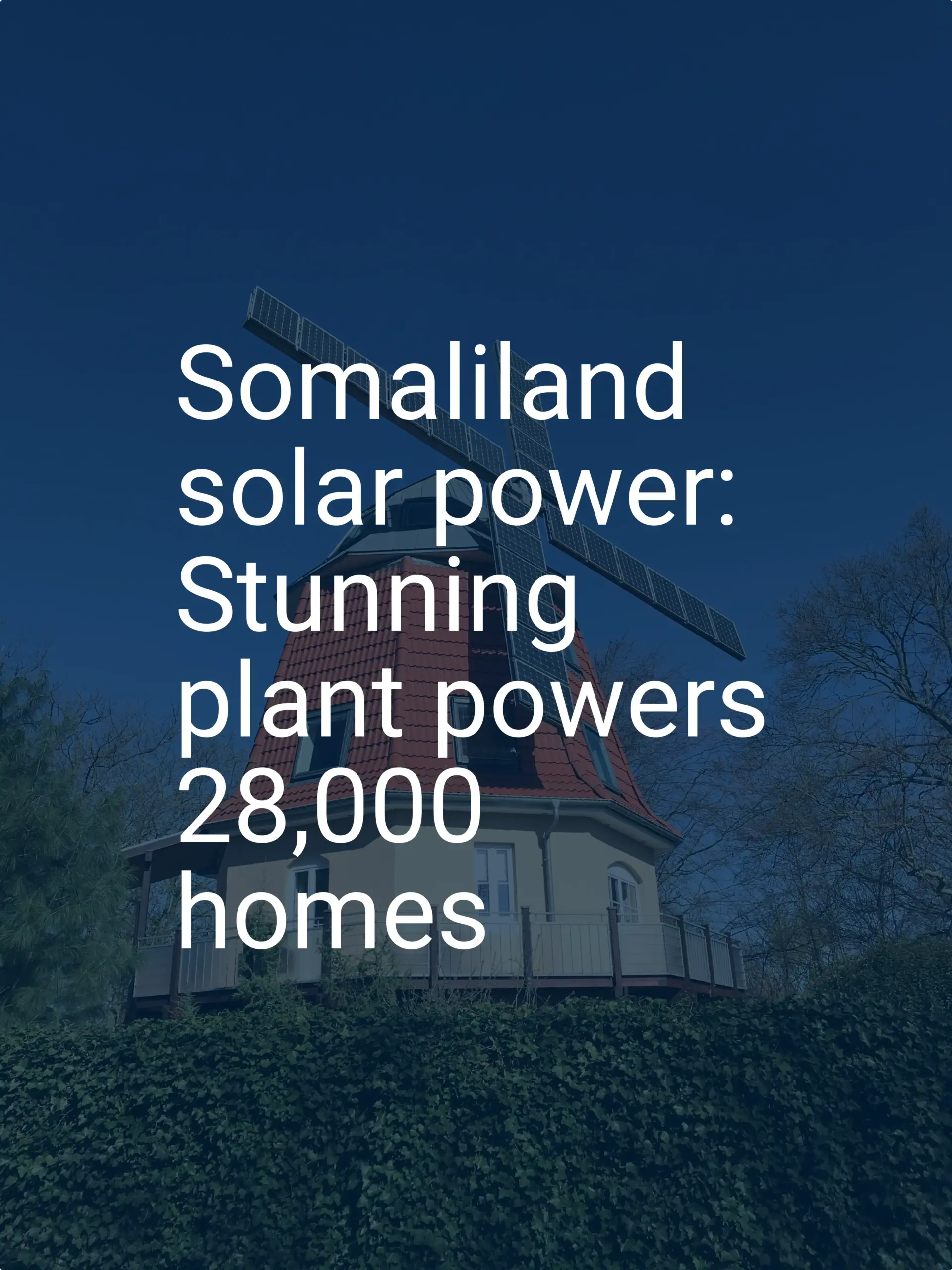The United Arab Emirates’ strategic initiatives, like “Operation 300bn” and “Net Zero by 2050,” are generating powerful momentum for industrial and renewable energy development. For an entrepreneur considering the solar manufacturing sector, the UAE presents a compelling proposition, combining a strategic location with world-class infrastructure and strong governmental support.
However, long-term success hinges on a factor many new investors underestimate: mastering the unique dynamics of the local labor market.
Far from being a mere administrative task, understanding the regulatory framework, workforce composition, and associated costs is a cornerstone of a viable business plan. This guide breaks down the key considerations for building and managing a workforce for a solar production facility in the UAE, turning a complex challenge into a manageable strategic advantage.
The UAE Labor Landscape: A Modernizing Regulatory Framework
The UAE’s labor environment is governed by a progressive legal structure designed to protect employee rights while giving businesses the flexibility they need to thrive. The primary legislation is Federal Decree-Law No. 33 of 2021, which replaced the previous law and introduced several modern concepts.
For business owners, this new law signals a move towards greater adaptability. Key features include:
-
Flexible Work Models: The law formally recognizes part-time, temporary, and flexible work arrangements, allowing a factory to adjust staffing based on production cycles.
-
Non-Discrimination: It explicitly prohibits discrimination based on race, color, sex, religion, national origin, or disability, fostering a fair and inclusive workplace.
-
Defined Employment Contracts: All employees must be on fixed-term contracts not exceeding three years, which can be renewed. This provides clarity and predictability for both employer and employee.
The Ministry of Human Resources and Emiratisation (MoHRE) is the federal body responsible for overseeing these laws. Its robust digital systems, such as the Wages Protection System (WPS), ensure transparency and compliance, helping cement the UAE’s reputation as a stable and well-regulated place to do business.
Assembling Your Solar Factory Team: Workforce Composition
The UAE’s workforce is one of the most diverse in the world, with expatriates making up approximately 88% of the population. This dynamic presents both opportunities and specific obligations for an employer.
The Expatriate Workforce
The majority of your operational staff, from machine operators to specialized technicians, will likely be recruited from a vast pool of expatriate talent. Drawn primarily from South and Southeast Asia, as well as parts of Africa, this workforce includes a wide range of skill levels.
Establishing a solar factory means sponsoring these employees—a structured process that requires careful administrative planning for visas, work permits, and mandatory health insurance.
Emiratisation (Tawteen): A Strategic Consideration
Emiratisation is a national initiative aimed at increasing the participation of Emirati citizens in the private sector. For companies with 50 or more skilled employees, the government has set specific targets. As of 2024, these companies are required to increase their Emirati workforce in skilled roles by 2% annually.
While this might seem like a compliance challenge, it’s better viewed as a strategic imperative. Integrating qualified Emirati talent aligns your business with national development goals and can open doors to government incentives and support programs. Your workforce planning must also account for factory construction and operational requirements, as these influence staffing levels and the specific roles available for this initiative.
Essential Roles and Skill Sets for a Solar Module Line
A semi-automated solar module production line with a capacity of 20–50 MW typically requires a team of 25 to 30 employees per shift. These roles can be grouped into three main categories.
1. Technical and Engineering Staff:
These are the most critical roles and require specific industry experience.
-
Production Manager: Oversees the entire manufacturing process, from raw material intake to final product testing.
-
Quality Control (QC) Engineer: Ensures that every module meets international standards (e.g., IEC certifications). This role is fundamental to brand reputation.
-
Maintenance Technicians: Responsible for the uptime of key machinery like stringers, laminators, and testers.
Experience from J.v.G. turnkey projects shows that these key personnel are often recruited internationally, bringing established expertise to a new facility.
2. Semi-Skilled Machine Operators:
This group forms the bulk of the production workforce, operating the various stations along the assembly line. While prior experience is beneficial, these roles can often be filled by workers who receive on-the-job training. A thorough understanding of the complete solar module manufacturing process will help you define these specific roles and their training requirements.
3. Administrative and Support Staff:
This includes roles in Human Resources, Finance, and Logistics. Hiring staff with experience in the UAE market is crucial for navigating local regulations, procurement, and systems like the WPS.
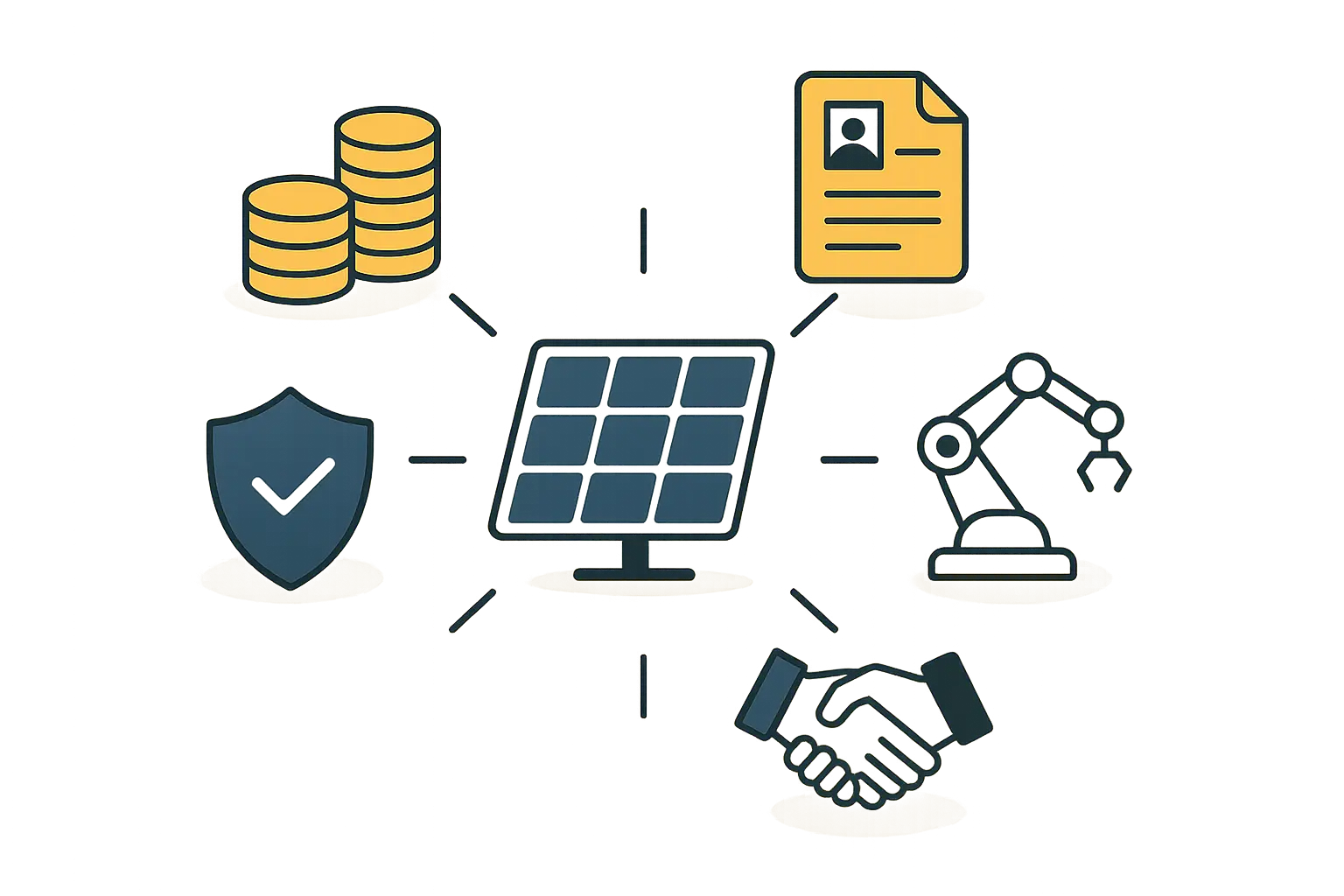
Understanding Labor Costs and Compensation in the UAE
One of the most frequent questions from new investors is about labor costs. While the UAE has no federally mandated minimum wage, compensation is driven by market rates that vary by industry, skill level, and nationality.
A typical compensation package in the UAE extends beyond a basic salary to include several key elements:
-
Basic Salary: The foundation of the pay structure, used to calculate other benefits.
-
Allowances: Standard practice includes providing allowances for housing and transportation, either as cash payments or in-kind benefits.
-
Health Insurance: Employers are legally required to provide health insurance for their employees, though the level of coverage can vary.
-
End-of-Service Gratuity (EOSG): This is a mandatory, legally defined severance payment, calculated as 21 days of basic salary for each of the first five years of service, and 30 days for each subsequent year.
Indicative Monthly Salary Ranges (Disclaimer: These are market estimates and can vary):
-
Production Line Operator: AED 2,500 – AED 4,500
-
Maintenance Technician: AED 5,000 – AED 9,000
-
QC Engineer: AED 8,000 – AED 15,000
These administrative and salary costs are a critical factor in determining the overall investment required to set up a solar factory.

Frequently Asked Questions (FAQ)
-
What are the standard working hours for a factory in the UAE?
The standard working week is 48 hours, typically eight hours per day over six days. Working hours during Ramadan are reduced by two hours per day for all employees. -
Is there a minimum wage I must pay my workers?
There is no federally mandated minimum wage. However, MoHRE may not approve a work permit if the proposed salary is deemed insufficient for basic living costs. Wages must be sufficient to attract and retain qualified staff. -
What is the process for terminating an employee?
Under the new law, termination requires a contractual notice period (typically 30–90 days). The law specifies legitimate reasons for termination, and arbitrary dismissal can lead to compensation claims. -
How does the Emiratisation policy affect a new factory with fewer than 50 employees?
Currently, the mandatory quotas apply to companies with 50 or more skilled employees. However, even smaller companies are encouraged to hire Emiratis, and doing so can provide a competitive advantage when dealing with government entities. -
Are labor unions permitted in the UAE?
Labor unions and strikes are not permitted. However, the law provides formal channels for collective dispute resolution, managed by MoHRE.
Building a Sustainable Workforce for the Future
The UAE offers access to a deep and diverse global talent pool, all within a structured and modernizing regulatory framework. For an investor in the solar manufacturing sector, the path to success involves more than importing machinery—it demands a skilled, compliant, and motivated workforce.
Strategic workforce planning—which includes budgeting for all compensation components, adhering to the Wages Protection System, and thoughtfully integrating Emiratisation policies—is essential. Proper preparation, supported by expert guidance, is what transforms the UAE’s significant market opportunity into a successful and sustainable manufacturing operation. Resources like the pvknowhow.com e-course can provide a structured framework for this critical planning phase.


